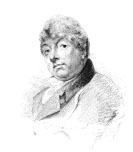Thomas Johnes | |
|---|---|
 Johnes by W. Worthington after Stothard | |
| Born | 1 September 1748 Ludlow, Shropshire, England |
| Died | 23 April 1816 Langstone Cliff cottage, Devon |
| Resting place | Eglwys Newydd (Saint Michael's Hafod Chapel) 52°22′12″N 3°57′42″W / 52.369939°N 3.961772°W |
| Nationality | Welsh |
| Education | Shrewsbury School, Eton College, Jesus College, Oxford and University of Edinburgh |
| Alma mater | Jesus College, Oxford |
| Occupation(s) | M.p., landlord, printer, writer, landscape architect, farmer |
| Known for | Agricultural endeavours at Hafod Estate |
| Title | Esquire, Colonel, Lord Lieutenant, Knight of the Shire |
| Spouse(s) | Maria Burgh of Monmouthshire; Jane Johnes of Dolaucothy |
| Children | Mariamne Johnes, (b. 30 June 1784, d. 4 July 1811), Evan Johnes, (b. 1786, died in infancy) |
| Parent(s) | Thomas Johnes of Llanvairchydogus and Elizabeth Knight, Croft Castle |
| Relatives | Richard Knight of Downton, Marchweithian, Lord of Isaled, William Wilberforce |
Thomas Johnes FRS (1 September 1748 – 23 April 1816) was a Member of Parliament, landscape architect, farmer, printer, writer and social benefactor. He is best known for his development of the Hafod Estate in Wales.[1]
Johnes was born in Ludlow, Shropshire, England. Upon moving from his family home at Croft Castle to an isolated area near Cwmystwyth, in Ceredigion, Wales, Johnes began his life works by building a church for the local tenants, a school, and magnificent gardens, walks and bridges.
He undertook experiments in sheep and cattle breeding together with the growing of new crops and a thriving dairy was established. Trees were planted in great quantities on land considered unsuitable for crops; Johnes obtained the Royal Society of Arts medal five times for planting trees. He encouraged his tenants to improve their farming practices when in 1800 he published A Cardiganshire Landlord's Advice to his Tenants, with a Welsh translation and offered prizes for good crops. He was also one of the chief supporters of the Cardiganshire Agricultural Society, founded in 1784. Johnes devoted his entire life fortune to improving Hafod Estate.[2][3]
- ^ Warwick William Wroth (1892). "Johnes, Thomas". In Dictionary of National Biography. 30. London. p. 2.
- ^ National Library of Wales, Welsh Biography Online
- ^ Cite error: The named reference
Annualwas invoked but never defined (see the help page).